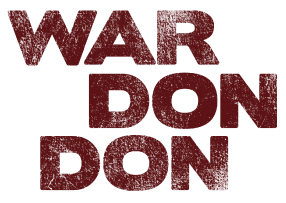
"War Don Don" means, as you have probably worked out, "War is Over" in Krio. It is the title of a documentary film made by Rebecca Richmond Cohen about justice, the Special Court for Sierra Leone and the particular story of Issa Sesay. Cohen actually interned on the defence team of the AFRC's Alex Tamba Brima before making the film but found herself drawn to Sesay and his story. She says, "I was fascinated by the range of roles that one man could assume amidst the intensity of such a brutal conflict. I became convinced that the story of his trial needed to reach a larger audience."
Revolutionary United Front (RUF)
Foday Saybana Sankoh, Sam Bockarie, Issa Hassan Sesay, Morris Kallon, Augustine Gbao.
What were they charged with?
Eighteen counts of crimes against humanity, war crimes and serious violations of international humanitarian law.
What does that mean?
They were accused of unlawful killings, causing physical violence and mental suffering, extermination, looting and burning, terrorizing the civilian population, enacting collective punishments, mutilations, rape, forced ‘marriages’, attacking UN peacekeepers and using child soldiers
What were they found guilty of?
Foday Saybana Sankoh, the leader of the RUF, died in custody before his trial could begin.
Sam Bockarie, the former Battlefield Commander of the RUF, was killed in Liberia two months after his indictment.
Issa Hassan Sesay was found guilty on 16 counts. He was not found guilty of killing or kidnapping UN personnel.
Morris Kallon was also found guilty on 16 counts. He was not found guilty of killing or kidnapping UN personnel.
Augustine Gbao was found guilty on 12 count. He was not found guilty of killing or kidnapping UN personnel, of enacting collective punishments or of enlisting child soldiers.
What sentences were they given?
Issa Hassan Sesay was sentenced to 52 years in prison.
Morris Kallon was sentenced to 40 years in prison.
Augustine Gbao was sentenced to 25 years in prison.
Armed Forces Revolutionary Council
Johnny Paul Koroma, Alex Tamba Brima AKA Gullit, Ibrahim Bazzy Kamara, Santigie Borbor Kanu AKA Five-Five.
What were they charged with?
Fourteen counts of crimes against humanity, war crimes and serious violations of international humanitarian law.
What does that mean?
They were accused of acts of terrorism, collective punishments, murder, extermination, rape, sexual slavery, outrages against human dignity, mutilation, looting, enslavement and the enlistment of child soldiers.
What were the found guilty of?
Johnny Paul Koroma, the former leader of the AFRC, has never been caught. Some believe him to be dead, others that he is alive and well and living overseas.
Alex Tamba Brima, Ibrahim Bazzy Kamara and Santigie Borbor Kanu were each found guilty on 11 counts. They were not found guilty of sexual slavery.
What sentences were they given?
Alex Tamba Brima was sentenced to 50 years in prison.
Ibrahim Bazzy Kamara was sentenced to 45 years in prison.
Santigie Borbor Kanu was sentenced to 50 years in prison.
Civil Defence Force (CDF)
Sam Hinga Norman, Moinana Fofana, Allieu Kondewa.
What were they charged with?
Eight counts of crimes against humanity, war crimes and serious violations of international humanitarian law.
What does that mean?
They were accused of unlawful killings, causing physical violence and mental suffering, looting and burning, terrorizing the civilian population, imposing collective punishments and using child soldiers.
What were they found guilty of?
Sam Hinga Norman, the head of the CDF, died before the end of his trial.
Moinana Fofana and Allieu Kondewa, after appeal, were found guilty on 5 counts. They were not found guilty terrorizing the civilian population, imposing collective punishments or using child soldiers.
What sentences were they given?
Moinana Fofana was given 15 years in prison.
Allieu Kondewa was given 20 years in prison.
Charles Taylor
What was he charged with?
Eleven counts of crimes against humanity, war crimes and serious violations of international humanitarian law.
What does that mean?
He stands accused of unlawful killings, causing physical violence, looting, terrorizing the civilian population, imposing collective punishments, rape and other forms of sexual violence, abductions, forced labour and the enlistment of child soldiers.
What was he found guilty of?
Taylor’s trial continues.
Find out more about War Don Don by clicking here.
No comments:
Post a Comment